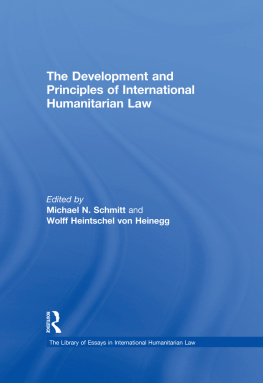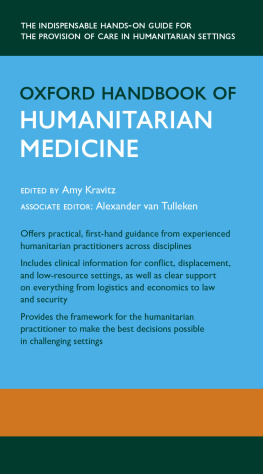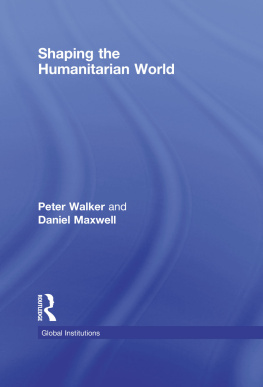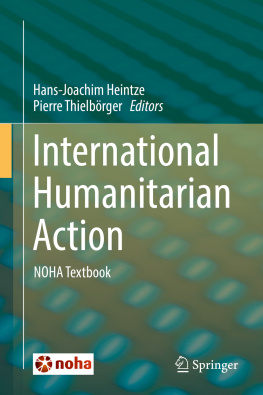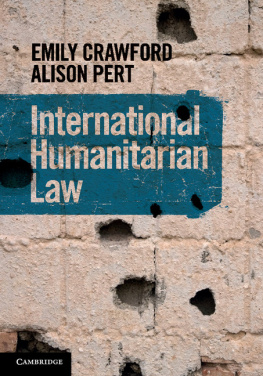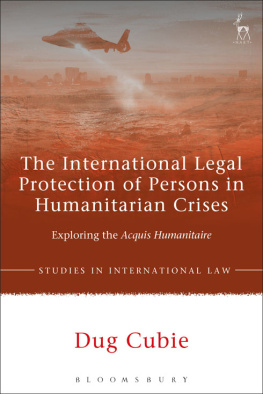The Development and Principles of International Humanitarian Law
The Library of Essays in International Humanitarian Law
Series Editors: Michael N. Schmitt and Wolff Heintschel von Heinegg
Titles in the Series:
The Development and Principles of International Humanitarian Law
Michael N. Schmitt and Wolff Heintschel von Heinegg
The Scope and Applicability of International Humanitarian Law
Michael N. Schniitt and Wolff Heintschel von Heinegg
The Conduct of Hostilities in International Humanitarian Law, Volume I
Michael N. Schmitt and Wolff Heintschel von Heinegg
The Conduct of Hostilities in International Humanitarian Law, Volume II
Michael N. Schmitt and Wolff Heintschel von Heinegg
Detention and Occupation in International Humanitarian Law
Michael N. Schmitt and Wolff Heintschel von Heinegg
The Implementation and Enforcement of International Humanitarian Law
Michael N. Schmitt and Wolff Heintschel von Heinegg
The Development and Principles of International Humanitarian Law
Edited by
Michael N. Schmitt
US Naval War College, USA
Wolff Heintschel von Heinegg
Europa-Universitat Viadrina, Germany
First published 2012 by Ashgate Publishing
Published 2016 by Routledge
2 Park Square, Milton Park, Abingdon, Oxon OX14 4RN
711 Third Avenue, New York, NY 10017, USA
Routledge is an imprint of the Taylor & Francis Group, an informa business
Copyright Michael N. Schmitt and Wolff Heintschel von Heinegg 2012. For copyright of individual articles please refer to the Acknowledgements.
All rights reserved. No part of this book may be reprinted or reproduced or utilised in any form or by any electronic, mechanical, or other means, now known or hereafter invented, including photocopying and recording, or in any information storage or retrieval system, without permission in writing from the publishers.
Notice:
Product or corporate names may be trademarks or registered trademarks, and are used only for identification and explanation without intent to infringe.
Wherever possible, these reprints are made from a copy of the original printing, but these can themselves be of very variable quality. Whilst the publisher has made every effort to ensure the quality of the reprint, some variability may inevitably remain.
British Library Cataloguing in Publication Data
The development and principles of international humanitarian law. (The library of essays in international humanitarian law)
1. Humanitarian law Interpretation and construction. 2. Humanitarian law History.
I. Series II. Schmitt, Michael N. III. Heintschel von Heinegg, Wolff.
341.6'7dc23
Library of Congress Control Number: 2011946287
ISBN 9780754629344 (hbk)
The editors and publishers wish to thank the following for permission to use copyright material.
Cambridge University Press for the essays: Jean-Marie Henckaerts (2005), 'Study on Customary International Humanitarian Law: A Contribution to the Understanding and Respect for the Rule of Law in Armed Conflict', International Review of the Red Cross, 87, pp. 175-97. Copyright 2005 International Committee of the Red Cross; Yves Sandoz (2003), 'International Humanitarian Law in the Twenty-First Century', Yearbook of International Humanitarian Law , 6, pp. 3-10. Copyright 2003 Y. Sandoz; Frits Kalshoven (1999), 'The Undertaking to Respect and Ensure Respect in All Circumstances: From Tiny Seed to Ripening Fruit". Yearbook ofInternational Humanitarian Law, 2, pp. 3-61. Copyright 1999 TMC Asser Press and F. Kalshoven.
Copyright Clearance Center for the essays: Dietrich Schindler (2003), 'International Humanitarian Law: Its Remarkable Development and its Persistent Violation', Journal of the History of International Law, , pp. 165-88. Copyright 2003 Kluwer Academic Publishers; Theodor Meron (2000), 'The Humanization of Humanitarian Law', American Journal of International Law, , pp. 239-78. Copyright 2000 American Society of International Law; Burrus M. Carnahan (1998), 'Lincoln, Lieber and the Laws of War: The Origins and Limits of the Principle of Military Necessity', American Journal of International Law, , pp. 213-31. Copyright 1998 American Society of International Law; George H. Aldrich (1986), 'Progressive Development of the Laws of War: A Reply to Criticisms of the 1977 Geneva Protocol I', Virginia Journal of International Law , , pp. 693-720. Copyright 1986 Virginia Journal of International Law; Josef L. Kunz (1951), 'The Chaotic Status of the Laws of War and the Urgent Necessity for their Revision', American Journal of International Law, , pp. 37-61. Copyright 1951 American Society of International Law; Jean S. Pictet (1951), 'The New Geneva Conventions for the Protection of War Victims', American Journal of International Law, 45, pp. 462-75. Copyright 1951 American Society of International Law; Theodor Meron (1992), 'Shakespeare's Henry the Fifth and the Law of War', American Journal of International Law , 86, pp. 145. Copyright 1992 American Society of International Law; Chris af Jochnick and Roger Normand (1994), 'The Legitimation of Violence: A Critical History of the Laws of War', Harx'ard International Law Journal, 35, pp. 49-95. Copyright 1994 Harvard University Law School; William Gerald Downey, Jr (1953), 'The Law of War and Military Necessity", American Journal of International Law, 47, pp. 251-62. Copyright 1953 American Society of International Law; James W. Garner (1915), 'Some Questions of International Law in the European War', American Journal of International Law , 9, pp. 72-112. Copyright 1915 American Society of International Law; Theodor Meron (2000), 'The Martens Clause, Principles of Humanity, and Dictates of Public Conscience', American Journal of International Law, , pp. 78-89. Copyright 2000 American Society of International Law; Josef L. Kunz (1956), 'The Laws of War', American Journal of International Law, , pp. 313-37. Copyright 1956 American Society of International Law.
Oxford University Press for the essay: Antonio Cassese (2000), 'The Martens Clause: Half a Loaf or Simply Pie in the Sky?', European Journal of International Law, , pp. 187-216. Copyright 2000 Oxford University Press.
Naval Warfare Studies for the essay: Horace B, Robertson, Jr (1998), 'The Principle of the Military Objective in the Law of Armed Conflict', in M.N. Schmitt (ed.), The Law of Military Operations , Newport, RI: US Naval War College International Law Studies, pp. 197-223.
Every effort has been made to trace all the copyright holders, but if any have been inadvertently overlooked the publishers will be pleased to make the necessary arrangement at the first opportunity.
Over half a century ago, Sir Hersch Lauterpacht, then Whewell Professor of International Law at the University of Cambridge, observed that 'if international law is the vanishing point of law, the law of war is at the vanishing point of international law'. He was wrong. While it is true that the law of war, or international humanitarian law as it has become known, is particularly vulnerable to the vagaries of political, social and economic influences, it has nevertheless proven itself a robust normative regime that positively shapes man's most destructive undertaking warfare. No other body of law can be credited with saving more lives or alleviating as much suffering.
These six volumes comprise a collection of particularly significant works on humanitarian law. They are intended for use by scholars, practitioners and students who seek to better understand the topics addressed herein, together with their lineage. Just as importantly, they allow users to begin to separate the wheat from the chaff. The proliferation of publications in the field, in part a sad reflection of the fact that armed conflict remains so horribly pervasive, as well as the digitization that facilitates access to journals that would not otherwise be readily available, often results in information overload. A Ministry of Defence legal adviser looking for background material to address a situation involving belligerent occupation will, for instance, uncover scores of articles. The student writing a dissertation on the law of targeting or a scholar penning an article on detention will find him- or herself buried in material. Unfortunately, some of what they unearth will prove misguided, out of context or simply wrong. This collection will not break down these obstacles in their entirety. But it does afford a useful starting-point by offering topically arranged humanitarian law journal essays that have been thoroughly vetted by many of the top experts in the field.

